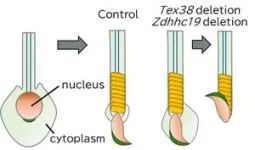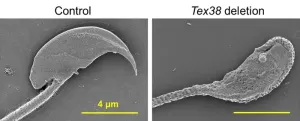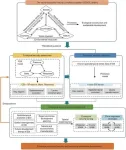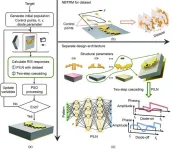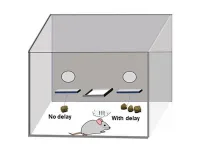(Press-News.org)
Learning to think more about specific events in the future appears to reduce impulsivity, improve decision-making, and shows potential as a therapy for alcohol use disorder, a new Virginia Tech study found.
The study, which involved 24 participants whose brains were scanned during both resting-state and task-based fMRI, showed brain connections were altered by future thinking.
The research, published recently in the journal Brain Connectivity, was among the last led by the late Warren Bickel, professor and director of the Addiction Recovery Research Center at the Fralin Biomedical Research Institute at VTC.
Bickel, who died of cancer in September, was a leading researcher in the field of using “episodic future thinking” – the capacity to vividly imagine events that might happen in your future – to address addiction.
“What we were trying to understand was how episodic future thinking works as a kind of therapeutic approach,” said Stephen LaConte, professor and corresponding author on the paper. “What we found is that training people to think more about their future changed the extent to which they value immediate rewards over those in the future, and we’re seeing related changes in connectivity in key regions of the brain along with that.”
The Fralin Biomedical Research Institute study is the first in which participants practiced imagining specific, personal future events in the lab before returning to those thoughts during an MRI brain scan to identify brain activity changes.
For example, a subject might think, “In one year, I will be opening my first art gallery in Los Angeles,” along with details of the sights, sounds, and feelings of the gallery opening.
Alcohol use disorder is characterized in part by an impaired ability to think clearly about the future and a tendency toward impulsive decision making. The phenomenon is called delay discounting, or valuing delayed rewards less than immediate ones.
Previous studies have demonstrated the effectiveness of episodic future thinking in reducing delay discounting and promoting making healthier choices, and it’s emerging as a potential behavioral intervention for substance use disorders.
Participants exhibited reduced impulsivity in their decision-making, and greater ease at more challenging tasks in deciding between immediate and delayed rewards. At the same time, the scientists noticed increased connection between multiple regions of the brain called the salience network.
“We found that in the delayed discounting tasks, people who had this higher functional connectivity actually were able to perform the hard tasks more quickly,” said LaConte, who is also interim co-director of the Addiction Recovery Research Center. “What that means is that either the episodic future thinking is making the tasks easier, or it’s freeing up some brain resources and temporarily changing their delay discounting. We don’t yet know which.”
The study provides a baseline for future research, said Jeremy Myslowski, the paper’s first author.
“We see this as a fruitful opportunity to examine potential changes in brain connectivity by collecting data both before and after the intervention,” said Myslowski, a doctoral candidate in LaConte’s lab when he worked on the study. He has since graduated. “And when we move into performing work with a real-world alcohol consumption component, we have something tangible in the brain data to point to.”
Further research is needed to determine how long-lasting the behavioral and connectivity changes are.
LaConte noted that the results closely mirrored a 2020 study of brain connectivity in people receiving antidepressants for the first time, which bolstered the idea that episodic future thinking could be a valuable early intervention therapy, and the brain connectivity the study documented could be a useful marker for success in evaluating therapies for psychiatric diseases.
LaConte and Bickel were longtime collaborators at the Fralin Biomedical Research Institute. Bickel was among the first to recognize the importance of episodic future thinking in understanding and treating substance use disorders.
END
A recent study published in Engineering presents an innovative strategy for converting plastic waste into useful products. The research, led by a team of scientists from the Korea Institute of Science and Technology (KIST) and other institutions, focuses on polystyrene (PS), a commonly used plastic that poses significant challenges for waste management.
Plastic pollution has become a pressing environmental issue due to the increasing production and improper disposal of plastic products. PS, in particular, is difficult to degrade naturally and often ends up in landfills or the environment, contributing to the spread of microplastics. Current methods for treating ...
When sea otters were reintroduced along the coastlines of islands in Southern California and British Columbia, researchers saw kelp forests return to areas that were destroyed by sea urchins. But how slow or fast they grew back depended on the location — and until now, scientists didn’t understand why.
New CU Boulder research found sea otters, an important keystone species, play a vital role in kelp forest recovery, but their level of influence depends on what other species they interact with in salty Pacific Ocean waters. The study, published ...
A new study from Tulane University suggests that repeated collapse and reopening of tiny alveoli—air sacs in the lungs essential for breathing—during mechanical ventilation may cause microscopic tissue damage, playing a key role in ventilator-related injuries that contribute to thousands of deaths annually.
Published in the Proceedings of the National Academy of Sciences (PNAS), the study sheds light on ventilator-induced lung injury, a complication that gained increased attention during the COVID-19 pandemic, which led to a surge in patients requiring ...
Osaka, Japan – The human body is full of checks and balances that ensure correct growth, development, and function of all our different systems. Now, researchers from Japan have reported a newly discovered protein interaction that regulates sperm development.
In a study to be published soon in PNAS, a multi-institutional research team led by Osaka University has revealed that the interaction between two specific proteins is crucial for ensuring that sperm cells develop properly.
Sperm formation is a highly complex process that involves many changes ...
A Yale-led research team has uncovered how a naturally occurring biological mechanism found in mammals is able to prevent sperm cells from interacting with an egg, preventing fertilization.
The discovery, identified in rodent models, offers a new path for scientific research to help people grappling with infertility issues, while also opening a new line of study for developing contraceptive therapies. The findings appear in the journal Proceedings of the National Academy of Sciences.
“This will have direct implications ...
In a recent study published in Engineering, researchers have developed an innovative analytical framework for ecological security assessment, prediction, and zoning management. Guided by the Social–Economic–Natural Complex Ecosystems (SENCE) theory, this framework aims to enhance ecological security for sustainable development.
The Daqing River Basin in the North China Plain was chosen as a case study due to its ecological significance and the increasing human-land conflicts. The research team established an assessment index system based on the pressure-state-response ...
A recent study published in Engineering introduces an innovative design paradigm for reconfigurable intelligent surfaces (RISs), aiming to enhance their design efficiency and versatility. This research, led by a team of scientists from Southeast University and Guangzhou University, offers a fresh approach to address the challenges in RIS design.
RISs, enabled by digital coding technology, are crucial for manipulating electromagnetic (EM) waves in real-time. They play a significant role in 5G and 6G research. However, traditional automatic RIS design methods face issues. Most involve extensive numerical simulations ...
Researchers have widely accepted that impulsivity increases the risk of drug addiction, but the evidence to support this belief is mixed. Exploring the relationship between impulsivity and cocaine use in rats, Yihong Yang and colleagues from the National Institute on Drug Abuse found evidence that contradicts the prevailing view that high impulsivity predicts cocaine use.
One classification of impulsivity is impulsive choice, which can be studied with risky choice tasks and delay-discounting tasks (DDT). During DDT, impulsive individuals prefer smaller, ...
London’s Ultra Low Emission Zone (ULEZ) is transforming children’s journeys to school by making streets safer, improving perceptions of air quality and encouraging children to live healthier lives. A new study published today in BMJ Open, and funded by the National Institute for Health and Care Research (NIHR), highlights its benefits, with many families noticing cleaner air and safer roads. However, it also reveals challenges, particularly for those living in outer boroughs who are more reliant on the car and may struggle to adapt.
Road traffic is a major source of air pollution in London, posing serious health risks. One in 11 children in the city has asthma, a condition ...
Tulane University researchers have developed a CRISPR-based test that diagnoses Pneumocystis jirovecii pneumonia (PJP) — a life-threatening fungal infection primarily affecting children and immunocompromised patients — more quickly and less invasively, according to a new study published in the Journal of Clinical Investigation.
The highly accurate test detects RNA from live fungi in blood samples and throat swabs, eliminating the need for invasive bronchoscopy procedures currently used for diagnosis.
"Current diagnostic methods haven't evolved in ...

